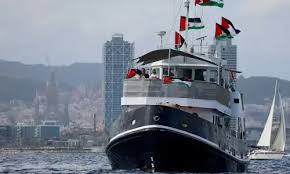EU asylum rules are ‘prehistoric,’ Steinmeier says in Italy

Rome: Germany’s President Frank-Walter Steinmeier on Thursday made an urgent call for movement on the topic of a reformed and standardized European asylum policy.
In recent days, thousands of migrants have arrived on the Italian island of Lampedusa, prompting local authorities to declare a state of emergency.
“There must be progress here, that’s not even in question,” Steinmeier said while adding that the world had moved on from the Dublin Accord, a regulation aimed at rapidly determining and establishing the EU member state responsible for an asylum application.
“The Dublin rules are prehistoric. That was another world, there was no mass migration.”
Germany’s president also expressed hope that the two countries would again meet on migration policy in the months to come.
Steinmeier made the comments after meeting with Italy’s President Sergio Mattarella in Sicily, where the two heads of state visited a center for refugees.
Many of those arriving in Italy use North Africa as their departure point, with Libya and Tunisia regarded as gateway countries.
Steinmeier is on a three-day visit to Italy for meetings with his Italian counterpart to discuss cooperation, migration and climate change among other issues and comes amid a surge in irregular migration to southern Italy.
Steinmeier, Mattarella call on Libyan factions to pursue peace
In an attempt to address the issue at one of the main sources, the European leaders took the opportunity to urge rival Libyan factions to move ahead with a peace process.
“We encourage all political actors to heed the Libyan people’s call for peace and stability based on a renewed sense of national unity and purpose,” the two presidents said in a joint statement on Thursday.
Libya has been in a state of civil war since Muammar Gadhafi was overthrown and lynched in 2011.
Armed groups have aligned themselves with two rival authorities — the Tripoli-based Government of National Unity (GNU) and the Government of National Stability (GNS) in the east — who have competing governments which has caused political chaos.
The level of political dysfunction has been cited as one of the reasons why the devastating flood earlier in September, took such a deadly toll.
Steinmeier and Mattarella said in their statement that the catastrophe “can serve as a wake-up call” for authorities in the North African country.
The coastal city of Derna was hardest hit after two dams burst, and the resulting torrent of water destroyed much of the city.
The World Health Organization (WHO) said the flood killed around 4,000 people and left thousands more missing.
Ahead of his visit, Steinmeier had called for “fair distribution” of migrants arriving irregularly in Europe.
In an interview with Italy’s Corriere della Sera newspaper, Steinmeier said both Italy and Germany were “at their limits” and stressed the need for “stronger controls and surveillance at our external borders.”
Earlier this month Berlin said it would no longer be taking in migrants from Italy under a voluntary solidarity pact, until further notice.
Germany’s Interior Ministry said it was taking this decision because Italy had been refusing to take back other migrants who under the terms of the EU’s Dublin Regulation should be returned to Italy.
Under EU law, the member state that asylum seekers first enter is responsible for their asylum applications.
The first iteration of the Dublin Regulation dates back to 1990 and came into force in 1997. It has been reformed twice since.
The quite considerable differences within the EU on how multicultural and how open to migration member states and their changing governments are has in the past proved a major obstacle to reforming it, with compromises typically necessary on all sides.





